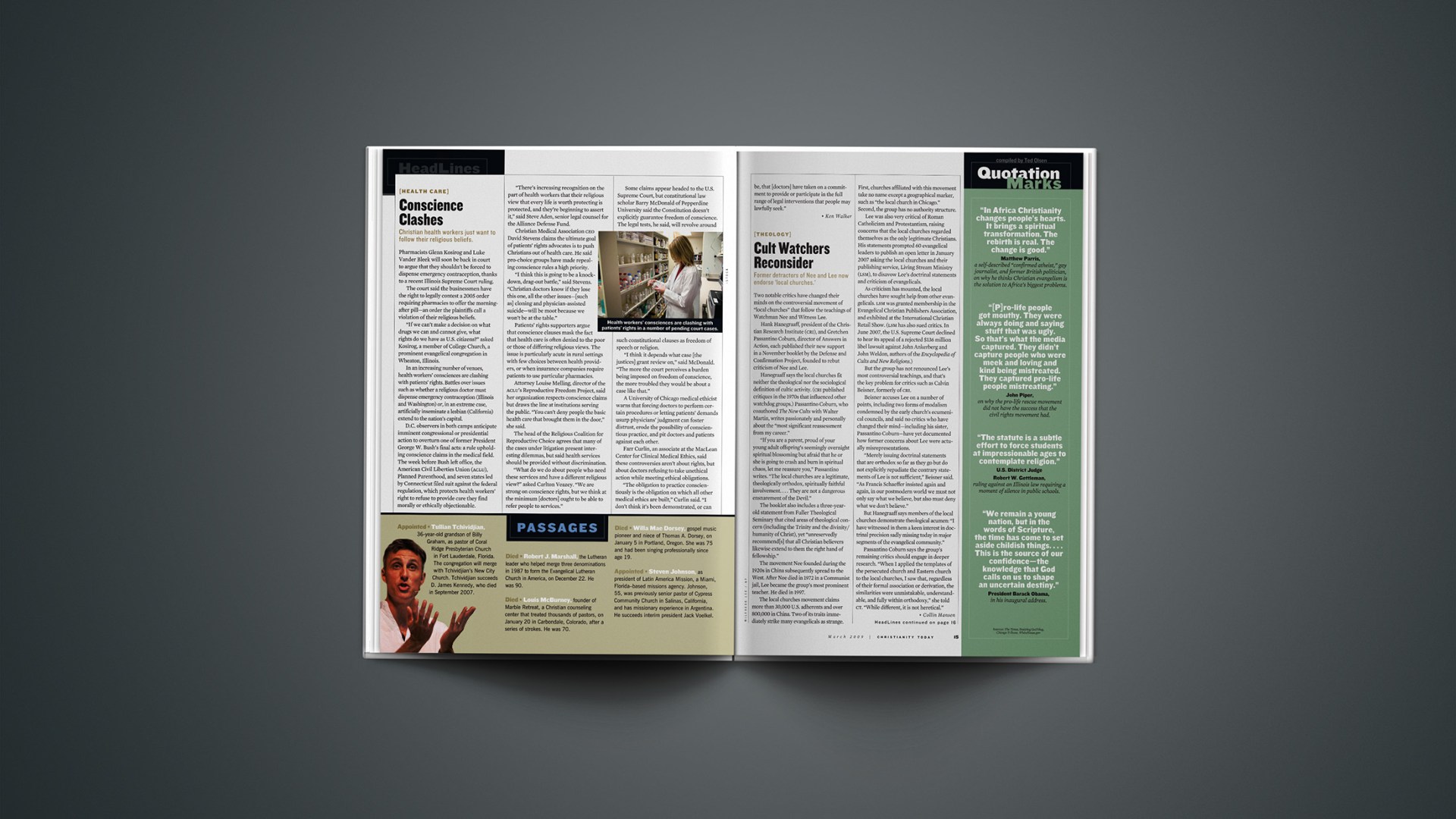Pharmacists Glenn Kosirog and Luke Vander Bleek will soon be back in court to argue that they shouldn’t be forced to dispense emergency contraception, thanks to a recent Illinois Supreme Court ruling.
The court said the businessmen have the right to legally contest a 2005 order requiring pharmacies to offer the morning-after pill—an order the plaintiffs call a violation of their religious beliefs.
“If we can’t make a decision on what drugs we can and cannot give, what rights do we have as U.S. citizens?” asked Kosirog, a member of College Church, a prominent evangelical congregation in Wheaton, Illinois.
In an increasing number of venues, health workers’ consciences are clashing with patients’ rights. Battles over issues such as whether a religious doctor must dispense emergency contraception (Illinois and Washington) or, in an extreme case, artificially inseminate a lesbian (California) extend to the nation’s capital.
D.C. observers in both camps anticipate imminent congressional or presidential action to overturn one of former President George W. Bush’s final acts: a rule upholding conscience claims in the medical field. The week before Bush left office, the American Civil Liberties Union (ACLU), Planned Parenthood, and seven states led by Connecticut filed suit against the federal regulation, which protects health workers’ right to refuse to provide care they find morally or ethically objectionable.
“There’s increasing recognition on the part of health workers that their religious view that every life is worth protecting is protected, and they’re beginning to assert it,” said Steve Aden, senior legal counsel for the Alliance Defense Fund.
Christian Medical Association CEO David Stevens claims the ultimate goal of patients’ rights advocates is to push Christians out of health care. He said pro-choice groups have made repealing conscience rules a high priority.
“I think this is going to be a knockdown, drag-out battle,” said Stevens. “Christian doctors know if they lose this one, all the other issues—[such as] cloning and physician-assisted suicide—will be moot because we won’t be at the table.”
Patients’ rights supporters argue that conscience clauses mask the fact that health care is often denied to the poor or those of differing religious views. The issue is particularly acute in rural settings with few choices between health providers, or when insurance companies require patients to use particular pharmacies.
Attorney Louise Melling, director of the ACLU’s Reproductive Freedom Project, said her organization respects conscience claims but draws the line at institutions serving the public. “You can’t deny people the basic health care that brought them in the door,” she said.
The head of the Religious Coalition for Reproductive Choice agrees that many of the cases under litigation present interesting dilemmas, but said health services should be provided without discrimination.
“What do we do about people who need these services and have a different religious view?” asked Carlton Veazey. “We are strong on conscience rights, but we think at the minimum [doctors] ought to be able to refer people to services.”
Some claims appear headed to the U.S. Supreme Court, but constitutional law scholar Barry McDonald of Pepperdine University said the Constitution doesn’t explicitly guarantee freedom of conscience. The legal tests, he said, will revolve around such constitutional clauses as freedom of speech or religion.
“I think it depends what case [the justices] grant review on,” said McDonald. “The more the court perceives a burden being imposed on freedom of conscience, the more troubled they would be about a case like that.”
A University of Chicago medical ethicist warns that forcing doctors to perform certain procedures or letting patients’ demands usurp physicians’ judgment can foster distrust, erode the possibility of conscientious practice, and pit doctors and patients against each other.
Farr Curlin, an associate at the MacLean Center for Clinical Medical Ethics, said these controversies aren’t about rights, but about doctors refusing to take unethical action while meeting ethical obligations.
“The obligation to practice conscientiously is the obligation on which all other medical ethics are built,” Curlin said. “I don’t think it’s been demonstrated, or can be, that [doctors] have taken on a commitment to provide or participate in the full range of legal interventions that people may lawfully seek.”
Copyright © 2009 Christianity Today. Click for reprint information.
Related Elsewhere:
Christianity Today also has more articles on life ethics.










